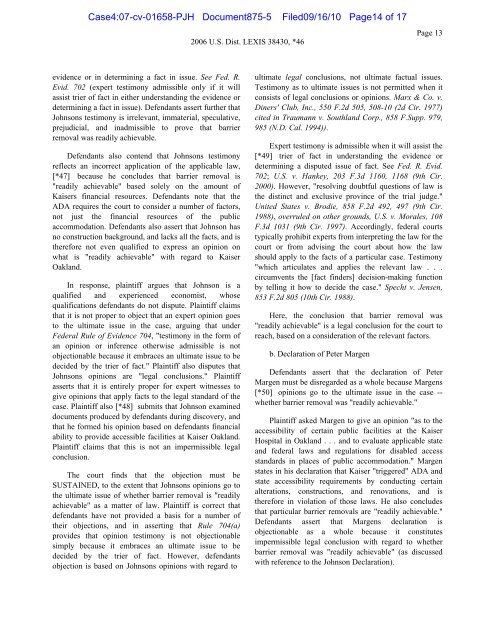exhibit 2 - SAP Lawsuit Portal
exhibit 2 - SAP Lawsuit Portal
exhibit 2 - SAP Lawsuit Portal
Create successful ePaper yourself
Turn your PDF publications into a flip-book with our unique Google optimized e-Paper software.
Case4:07-cv-01658-PJH Document875-5 Filed09/16/10 Page14 of 17<br />
evidence or in determining a fact in issue. See Fed. R.<br />
Evid. 702 (expert testimony admissible only if it will<br />
assist trier of fact in either understanding the evidence or<br />
determining a fact in issue). Defendants assert further that<br />
Johnsons testimony is irrelevant, immaterial, speculative,<br />
prejudicial, and inadmissible to prove that barrier<br />
removal was readily achievable.<br />
Defendants also contend that Johnsons testimony<br />
reflects an incorrect application of the applicable law,<br />
[*47] because he concludes that barrier removal is<br />
"readily achievable" based solely on the amount of<br />
Kaisers financial resources. Defendants note that the<br />
ADA requires the court to consider a number of factors,<br />
not just the financial resources of the public<br />
accommodation. Defendants also assert that Johnson has<br />
no construction background, and lacks all the facts, and is<br />
therefore not even qualified to express an opinion on<br />
what is "readily achievable" with regard to Kaiser<br />
Oakland.<br />
In response, plaintiff argues that Johnson is a<br />
qualified and experienced economist, whose<br />
qualifications defendants do not dispute. Plaintiff claims<br />
that it is not proper to object that an expert opinion goes<br />
to the ultimate issue in the case, arguing that under<br />
Federal Rule of Evidence 704, "testimony in the form of<br />
an opinion or inference otherwise admissible is not<br />
objectionable because it embraces an ultimate issue to be<br />
decided by the trier of fact." Plaintiff also disputes that<br />
Johnsons opinions are "legal conclusions." Plaintiff<br />
asserts that it is entirely proper for expert witnesses to<br />
give opinions that apply facts to the legal standard of the<br />
case. Plaintiff also [*48] submits that Johnson examined<br />
documents produced by defendants during discovery, and<br />
that he formed his opinion based on defendants financial<br />
ability to provide accessible facilities at Kaiser Oakland.<br />
Plaintiff claims that this is not an impermissible legal<br />
conclusion.<br />
The court finds that the objection must be<br />
SUSTAINED, to the extent that Johnsons opinions go to<br />
the ultimate issue of whether barrier removal is "readily<br />
achievable" as a matter of law. Plaintiff is correct that<br />
defendants have not provided a basis for a number of<br />
their objections, and in asserting that Rule 704(a)<br />
provides that opinion testimony is not objectionable<br />
simply because it embraces an ultimate issue to be<br />
decided by the trier of fact. However, defendants<br />
objection is based on Johnsons opinions with regard to<br />
2006 U.S. Dist. LEXIS 38430, *46<br />
ultimate legal conclusions, not ultimate factual issues.<br />
Testimony as to ultimate issues is not permitted when it<br />
consists of legal conclusions or opinions. Marx & Co. v.<br />
Diners' Club, Inc., 550 F.2d 505, 508-10 (2d Cir. 1977)<br />
cited in Traumann v. Southland Corp., 858 F.Supp. 979,<br />
985 (N.D. Cal. 1994)).<br />
Expert testimony is admissible when it will assist the<br />
[*49] trier of fact in understanding the evidence or<br />
determining a disputed issue of fact. See Fed. R. Evid.<br />
702; U.S. v. Hankey, 203 F.3d 1160, 1168 (9th Cir.<br />
2000). However, "resolving doubtful questions of law is<br />
the distinct and exclusive province of the trial judge."<br />
United States v. Brodie, 858 F.2d 492, 497 (9th Cir.<br />
1988), overruled on other grounds, U.S. v. Morales, 108<br />
F.3d 1031 (9th Cir. 1997). Accordingly, federal courts<br />
typically prohibit experts from interpreting the law for the<br />
court or from advising the court about how the law<br />
should apply to the facts of a particular case. Testimony<br />
"which articulates and applies the relevant law . . .<br />
circumvents the [fact finders] decision-making function<br />
by telling it how to decide the case." Specht v. Jensen,<br />
853 F.2d 805 (10th Cir. 1988).<br />
Here, the conclusion that barrier removal was<br />
"readily achievable" is a legal conclusion for the court to<br />
reach, based on a consideration of the relevant factors.<br />
b. Declaration of Peter Margen<br />
Page 13<br />
Defendants assert that the declaration of Peter<br />
Margen must be disregarded as a whole because Margens<br />
[*50] opinions go to the ultimate issue in the case -whether<br />
barrier removal was "readily achievable."<br />
Plaintiff asked Margen to give an opinion "as to the<br />
accessibility of certain public facilities at the Kaiser<br />
Hospital in Oakland . . . and to evaluate applicable state<br />
and federal laws and regulations for disabled access<br />
standards in places of public accommodation." Margen<br />
states in his declaration that Kaiser "triggered" ADA and<br />
state accessibility requirements by conducting certain<br />
alterations, constructions, and renovations, and is<br />
therefore in violation of those laws. He also concludes<br />
that particular barrier removals are "readily achievable."<br />
Defendants assert that Margens declaration is<br />
objectionable as a whole because it constitutes<br />
impermissible legal conclusion with regard to whether<br />
barrier removal was "readily achievable" (as discussed<br />
with reference to the Johnson Declaration).


